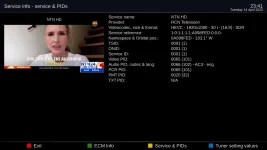I don't think it's an osmio4k or image issue but I was wondering if someone has a solution. I'm unable to get audio on this service at 4077V1900-5/6 16apsk on 103.0W. There's no audio on the hdmi cable between the TV and the osmio4k AND there's no audio when trying to play it through vlc or xine or smplayer on Ubuntu 18.04. There's only one audio selection (AC3). I tried a web search with DuckDuckGo but got no useful information. Here's the vlc log output:
-- logger module started --
main: Running vlc with the default interface. Use 'cvlc' to use vlc without interface.
main error: too low audio sample frequency (0)
main error: failed to create audio output
vlcpulse error: digital pass-through stream connection failure: Not supported
main error: module not functional
main error: failed to create audio output
glconv_vaapi_x11 error: vaInitialize: unknown libva error
glconv_vaapi_drm error: vaInitialize: unknown libva error
glconv_vaapi_drm error: vaInitialize: unknown libva error
main error: buffer deadlock prevented
user@server1:~$ vlc --version
VLC media player 3.0.8 Vetinari (revision 3.0.8-0-gf350b6b5a7)
VLC version 3.0.8 Vetinari (3.0.8-0-gf350b6b5a7)
Compiled by buildd on lcy01-amd64-014.buildd (Sep 11 2019 11:39:37)
Compiler: gcc version 7.4.0 (Ubuntu 7.4.0-1ubuntu1~18.04.1)
Here's a 5 minute recording of this service (large file):
https://smile.amazon.com/clouddrive/share/YSt1qboJpBJZZiFp91l7NMk8EMicov7W2FWLhQ8XZzz
-- logger module started --
main: Running vlc with the default interface. Use 'cvlc' to use vlc without interface.
main error: too low audio sample frequency (0)
main error: failed to create audio output
vlcpulse error: digital pass-through stream connection failure: Not supported
main error: module not functional
main error: failed to create audio output
glconv_vaapi_x11 error: vaInitialize: unknown libva error
glconv_vaapi_drm error: vaInitialize: unknown libva error
glconv_vaapi_drm error: vaInitialize: unknown libva error
main error: buffer deadlock prevented
user@server1:~$ vlc --version
VLC media player 3.0.8 Vetinari (revision 3.0.8-0-gf350b6b5a7)
VLC version 3.0.8 Vetinari (3.0.8-0-gf350b6b5a7)
Compiled by buildd on lcy01-amd64-014.buildd (Sep 11 2019 11:39:37)
Compiler: gcc version 7.4.0 (Ubuntu 7.4.0-1ubuntu1~18.04.1)
Here's a 5 minute recording of this service (large file):
https://smile.amazon.com/clouddrive/share/YSt1qboJpBJZZiFp91l7NMk8EMicov7W2FWLhQ8XZzz

